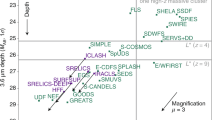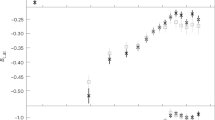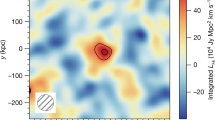Abstract
SIR JOSEPH LARMOR, who raised certain interesting points concerning the validity of my recent work on stellar luminosity in NATURE of Feb. 22, has kindly allowed me to see some further exposition on these points which he proposes to publish in the Observatory. With his further analysis of the situation I am in complete agreement. As regards the question which he thinks still outstanding, the work of Sir James Jeans and of J. Woltjer, together with my own investigations, shows that 1ββ, the ratio of radiation pressure to total pressure varies very slowly in the photospheric layers of a star on plausible assumptions as to the absorption coefficient. It therefore satisfies his requirement of being independent of the precise surface at which it is evaluated. But it is necessary to explain the discrepancy with other existing theories.
This is a preview of subscription content, access via your institution
Access options
Subscribe to this journal
Receive 51 print issues and online access
$199.00 per year
only $3.90 per issue
Buy this article
- Purchase on Springer Link
- Instant access to full article PDF
Prices may be subject to local taxes which are calculated during checkout
Similar content being viewed by others
Author information
Authors and Affiliations
Rights and permissions
About this article
Cite this article
MILNE, E. Atomic Physics and Related Subjects.: Communications to Nature.: The Problem of Stellar Luminosity. Nature 125, 453–454 (1930). https://doi.org/10.1038/125453a0
Issue Date:
DOI: https://doi.org/10.1038/125453a0
Comments
By submitting a comment you agree to abide by our Terms and Community Guidelines. If you find something abusive or that does not comply with our terms or guidelines please flag it as inappropriate.



